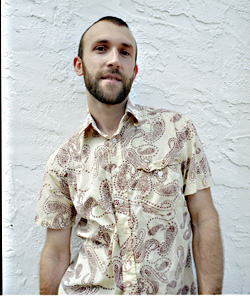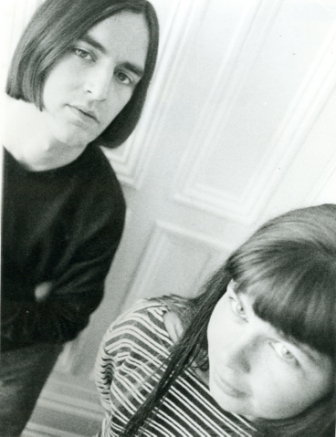RJD2 must have had balls of titanium to make the move he did with his latest, The Third Hand. I can’t recall another person in recent memory like RJ—someone already well-respected and acclaimed in the indie hip-hop world for his pristine production and rare samples—who has done something so drastic, especially at a point in his career where the dude is basically set. Instead of unearthing more dusty soul and funk relics from basements, RJD2’s latest trick was pulling an unexpected card—the singing card—from the musical deck.
“I kind of had an inkling that some people would’ve hated it,” he says. “But I couldn’t really accomplish everything I wanted to with sampling. There were a lot of limitations with it. It got to a point where I wanted more specific things to happen.”
Those specifics included writing original, sample-free pop songs with lyrics and hooks, completely produced and performed (including vocals) by RJ himself. Unlike his past records, there isn’t one sample to be found on The Third Hand. In the sample’s stead, RJ’s plaintive falsetto carries the songs, backed by piano, guitar, sequenced drum tracks, and various other sound makers. But it’s not always a good thing.
The lead single, “You Never Had It So Good,” was the first song RJ debuted on his MySpace page in January, indicating the sound he was going after. Some of his “friends” were digging it and supported the change. Others, like me, were utterly confused. With the heavy presence of the piano and its catchy hook, “You Never Had It So Good” had a Ben Folds feel to it, with vocals and lyrics that felt forced and one-dimensional.
Likewise, “Have Mercy” and “Reality” got into my head, but for all the wrong reasons. Have mercy on the listener, RJ, and focus on your strengths, not your weaknesses. “Laws of the God,” too, kind of sounds like something he’s done before, but it lacks samples and has a restricted, mechanical beat that’s almost boring. The synthy, minimal “Paper Bubble” apparently stemmed from some forgettable ’80s sci-fi or fantasy movie. Who are you trying to satisfy, RJ?
“I don’t want to re-create anything I’ve done in the past. I want to do something that’s new and fresh and exciting,” he says.
New? Yeah. Fresh? OK. Exciting? Hardly. It really says something when the highlight on The Third Hand is an instrumental, like “Get It,” which is about as close as it comes to the title track on Since We Last Spoke, with funky guitar, twinkling keys, and bombastic drums. And though “Beyond” has RJ singing (although not as much as on other songs), it has many qualities that hover into familiar RJD2 territory—the continuation of where he last left off. But that’s about as good as it gets.
Whether The Third Hand was created to inspire himself or his listeners, there was no denying that the risks he took on the album would be both praised and obliterated in reviews. One of the biggest media praises of the album is from Paste magazine: “RJD2’s daring innovation and unconventional melodies are enough to cement his reputation as hip-hop’s most adventurous musical astronaut.” Pitchfork, on the other end of the spectrum, says The Third Hand is “an unsettling piece of evidence that he’s lost without someone else’s pre-existing sounds to extrapolate from and transform.”
Perhaps the wisest choice RJ made was more business-related than musical. He sought to release The Third Hand on a label other than Definitive Jux, the label that released Deadringer and Since We Last Spoke (in 2002 and 2004, respectively). If The Third Hand had been released on the label, it would’ve made him the only “pop” act on the roster. The choice to go with XL Recordings, current home to pop-oriented acts like Elvis Perkins, White Stripes, and Tapes ‘n Tapes, was better suited for the album and the DJ-turned-songwriter.
Hell, with how The Third Hand has turned out, there’s a chance that RJD2 will be known down the road as the songwriter-turned-DJ. At least, we can hope.






